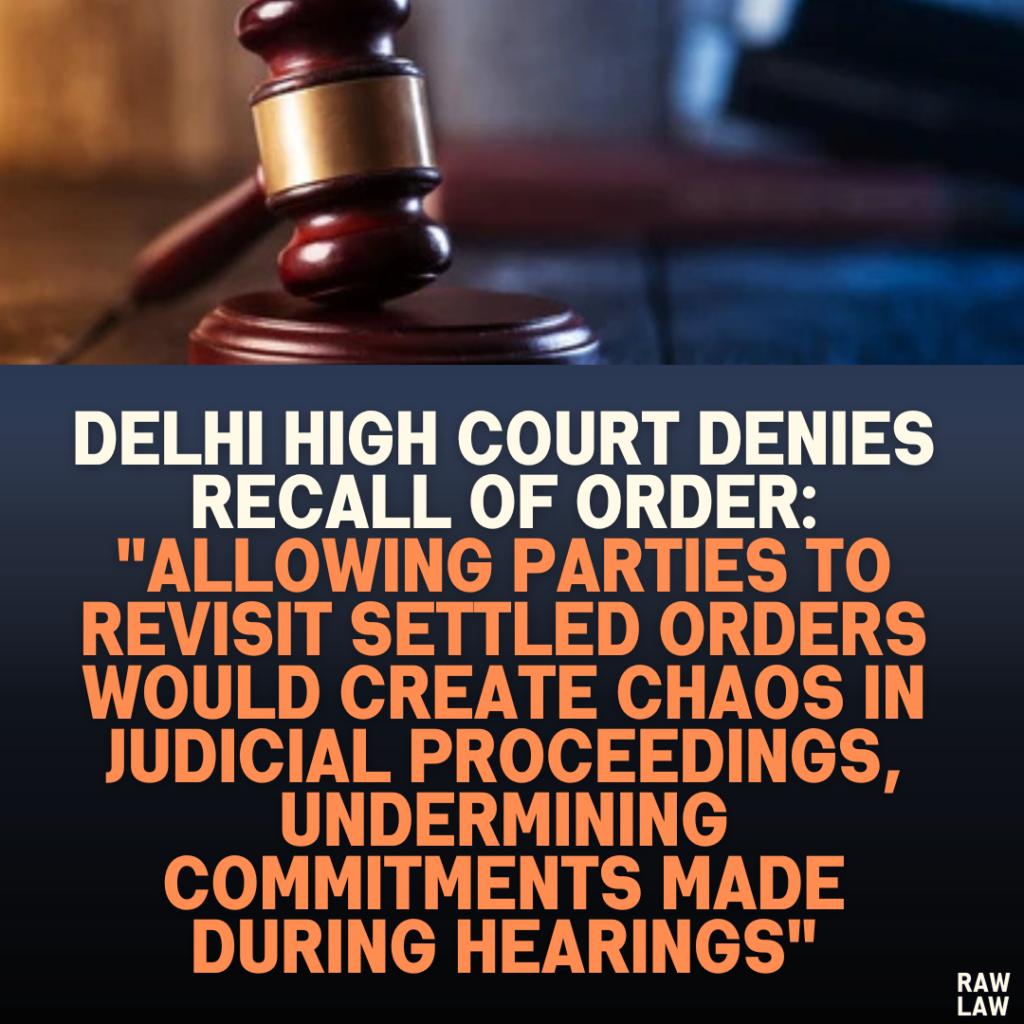Court’s Decision
The Delhi High Court dismissed the recall applications filed by SAI. The recall applications sought to reopen a February 28, 2024, order in which SAI had accepted an extension to comply with the Central Administrative Tribunal’s (CAT) directions. The court ruled that concessions made by counsel in court proceedings, if based on clear instructions, cannot later be withdrawn on claims of misunderstanding.
The court emphasized that permitting such withdrawal would erode judicial order sanctity and promote disorder in litigation.
Facts of the Case
- Tribunal Order:
- The Central Administrative Tribunal (CAT), in its judgment dated November 4, 2023, quashed termination orders against contractual employees of SAI.
- The Tribunal directed SAI to consider these employees as “Initial Constituents” under Rule 4(a) of the 2022 Staff Recruitment Rules, thereby securing their employment status until regularization.
- SAI’s Response:
- Dissatisfied with the Tribunal’s decision, SAI filed writ petitions before the High Court to challenge the CAT order.
- During proceedings, SAI’s counsel chose to withdraw the petitions, seeking additional time to comply with the CAT’s directive.
- Compliance and Contempt Proceedings:
- In April 2024, SAI issued a speaking order purportedly in compliance with the CAT order. This order became the subject of contempt proceedings initiated by the employees, alleging non-compliance.
- Recall Applications:
- SAI later sought to recall the February 28, 2024, High Court order, claiming its counsel misunderstood the scope of the CAT’s judgment.
Issues
- Can a concession made by counsel in court proceedings be retracted based on claims of misunderstanding?
- Did the Tribunal correctly interpret the 2022 Staff Recruitment Rules when ordering that employees be treated as “Initial Constituents”?
- What is the validity of the contempt proceedings against SAI for its alleged non-compliance?
Petitioner’s Arguments (SAI)
- Misunderstanding:
- SAI argued that its counsel misinterpreted the CAT order and believed it required only consideration, not automatic classification of employees as “Initial Constituents.”
- Rule Interpretation:
- The Tribunal’s directive to treat the employees as “Initial Constituents” allegedly contradicted the 2022 Staff Recruitment Rules.
- Request for Recall:
- SAI sought the court’s permission to argue the matter afresh on merits, retracting its earlier concession.
Respondent’s Arguments (Employees)
- Concession Binding:
- The respondents contended that concessions made by counsel in court are binding on the parties. They argued that permitting a retraction would undermine judicial integrity.
- Deliberate Delay:
- They argued that SAI’s actions were aimed at avoiding compliance with the Tribunal’s directives.
Analysis of the Law
- Sanctity of Concessions:
- The court highlighted that concessions by counsel during proceedings, if authorized, bind the parties. Withdrawal is only permissible if proven that the counsel acted beyond instructions or without authority.
- Rule Application:
- Rule 4(a) of the 2022 Staff Recruitment Rules defines “Initial Constituents.” The Tribunal interpreted this provision to include employees with the required qualifications working at the time of the rule’s implementation. This interpretation was key to protecting the employees from termination.
- Judicial Chaos:
- The court stressed that allowing parties to revisit settled orders would create chaos in judicial proceedings, encouraging litigants to renege on commitments made during hearings.
Precedent Analysis
The court referred to S.S. Moghe v. Union of India, a Supreme Court judgment affirming that administrative policies, including staffing decisions, must align with prescribed rules. This precedent validated the Tribunal’s directive requiring compliance with the 2022 rules.
Court’s Reasoning
- Binding Nature of Concessions:
- The court found no evidence that SAI’s counsel lacked instructions when conceding to comply with the Tribunal’s order. It ruled that the concession reflected the Tribunal’s directions verbatim and was therefore binding.
- Misunderstanding Unacceptable:
- Claims of misunderstanding by SAI’s counsel were rejected. The court emphasized that litigants must bear responsibility for their counsel’s submissions.
- Limited Grounds for Recall:
- The court clarified that recall applications are permissible only if an error in the court’s understanding or subsequent new facts justify reopening. Neither condition was met in this case.
Conclusion
- The court dismissed the recall applications, affirming that the February 28, 2024, order was consistent with the Tribunal’s judgment.
- It preserved SAI’s right to defend itself in the ongoing contempt proceedings before the Tribunal but refrained from commenting on their merits.
Implications
- Finality of Judicial Orders:
- The judgment underscores the binding nature of concessions made by counsel in court, reinforcing the finality of judicial orders.
- Compliance Obligations:
- Administrative authorities are reminded of their duty to comply fully with judicial directives.
- Accountability of Counsel:
- The ruling places accountability on counsel to represent clients accurately and adhere to instructions, ensuring credibility in court proceedings.




Pingback: Delhi High Court Dismisses Contempt Petitions Alleging Non-Compliance with Injunction Order: Holds That Intent is a Critical Element in Contempt Proceedings; Unintentional or Bona Fide Failure to Comply and Ambiguity in Judicial Orders Provide a Valid Def
Pingback: Delhi High Court Upholds NHAI’s Tender Annulment: "Failure to Comply with Bid Security Upload Requirements Validates Annulment to Maintain Procedural Integrity" - Raw Law